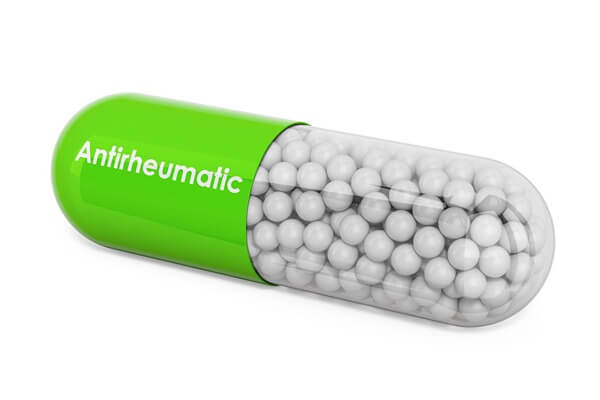Highlights
- Arthritis affects about a quarter of all American adults.
- Arthritis is the leading cause of work disability in the U.S.
- The disease can take many forms, and scores of drugs exist to treat it.
- Rheumatoid arthritis drugs can be pills, ointments, or injections.
- Let your doctor determine the best treatment for your rheumatoid arthritis based on the severity and frequency of your symptoms.
- BidRx helps you find the lowest price for rheumatoid arthritis medications.
Rheumatoid arthritis is an autoimmune condition, meaning that the immune system causes the disease, creating antibodies that mistakenly attack the tissues of the body. Smokers, women, and those with a family history of arthritis are more likely to develop the condition.
About Rheumatoid Arthritis Medications
In addition to physical therapy, home exercises, and surgery, medication is a common treatment for arthritis. RA medications allow many patients to live full, active lives.
With the right drugs, doctors can put rheumatoid arthritis into remission. While non-steroidal anti-inflammatory medications (NSAIDs) like aspirin and ibuprofen can help with mild to moderate symptoms, doctors have found that a more aggressive approach produces better patient outcomes.
In the U.S., arthritis affects 24 percent of adults. It is a costly condition from a medical insurance perspective and a leading cause of work disability.
Arthritis comes in many forms. Osteoarthritis, lupus, gout, and rheumatoid arthritis are all variants of the disease. Some of these arthritis forms have their own, dedicated medications.
The main classes of drugs doctors use to treat rheumatoid arthritis are:
- Analgesics (pain relievers), including NSAIDs
- Corticosteroids
- Disease-modifying anti-rheumatic drugs (DMARDs)
- Biologic response modifiers (a subclass of DMARDs)
- Antibiotics
- Platelet aggregation inhibitors
- Interleukin inhibitors
- Topical rubefacients
Analgesics
Analgesics are pain relievers. These drugs reduce the sensation of pain without putting patients to sleep. Symptomatic treatment does not address the root cause of the pain, so its efficacy is limited.
Analgesics – Categories
The analgesic combinations doctors use to treat rheumatoid arthritis are limited to acetaminophen/aspirin (like Excedrin Back and Body). The medication is available over the counter.
Narcotic analgesic combinations treat moderate to severe pain that less-potent analgesics can’t handle. Doctors use these combinations off-label, meaning they are approved by the FDA but not for this particular use.
These drugs limit pain sensations through the opioid system and can be addictive. In addition to binding to opioid receptors, these medications also inhibit COX enzymes.
Commonly prescribed narcotic analgesics include:
- Acetaminophen and hydrocodone (Norco, Lorcet, Hycet, Vicodin, Xodol, and others)
- Acetaminophen and tramadol (Ultracet)
Salicylates are salicylic acid salts or esters that have temperature-lowering, anti-inflammatory, and analgesic effects. The only OTC salicylate is aspirin (Arthritis Pain, Aspi-core, Aspir-low, Aspir 81, and others).
Prescription-only salicylates include:
- Salsalate (Salflex, Amigesic, Salsitab, and others)
- Diflunisal (Dolobid)
Warnings and Contraindications – Analgesics
Most people tolerate aspirin, the main component of rheumatoid arthritis analgesics, well, but many people are allergic to it. Those with blood-clotting problems and intestinal bleeding should also avoid these analgesics.
Narcotic analgesic combinations can be physically and emotionally addictive. The longer you take them, the more likely you are to develop an addiction.
Side Effects – Analgesics
Narcotic analgesics have side effects that can range from mild to severe. They include:
- Low blood pressure
- Shakiness
- Constipation
- Nausea and vomiting
- Slow heartbeat
- Skin rashes
- Breathing difficulties
Aspirin may interact with other drugs and cause stomach problems. Acetaminophen may aggravate existing liver conditions and cause liver damage. Ibuprofen may cause heartburn and cardiac problems, while caffeine can cause headaches, insomnia, and constipation.
Drug Interactions – Analgesics
Acetaminophen does not interact with other drugs, but aspirin does. Aspirin can interfere with the actions of the following:
- Blood thinners, such as heparin and warfarin
- Diuretics
- Antidepressants
- Corticosteroids like prednisone
- Ginkgo biloba
- Lithium
- Methotrexate
Non-steroidal Anti-inflammatory Drugs (NSAIDs)

NSAIDs are drugs that block COX enzymes, disrupting the actions of prostaglandins involved in the inflammation process. They relieve pain and fight inflammation at the same time. There are many NSAIDs available to treat rheumatoid arthritis, and they all act similarly.
Some NSAIDs block COX-1 enzymes, while others restrict COX-2. COX-2 blockers are less likely to cause gastrointestinal problems than those that block COX-1 enzymes.
Over-the-counter NSAIDs
In addition to aspirin, NSAIDs available over the counter include:
- Ibuprofen (Advil, Motrin, Nuprin, and others)
- Naproxen (Aleve, All Day Relief, Anaprox, and others)
- Ketoprofen (Orudis, Actron, and others)
Prescription NSAIDs
Prescription-only NSAIDs include:
- Meloxicam (Mobic)
- Diclofenac (Voltaren, Cataflam, and others)
- Nabumetone (Relafen DS)
- Etodolac (Lodine, Lodine XL)
- Indomethacin (Indocin)
- Piroxicam (Feldene)
- Sulindac (Clinoril)
- Diclofenac/misoprostol (Arthrotec)
- Esomeprazole/naproxen (Vimovo)
- Oxaprozin (Daypro)
- Diflunisal (Dolobid)
- Famotidine/ibuprofen (Duexis)
- Fenoprofen (Nalfon, Fenortho)
- Flurbiprofen (Ansaid)
- Meclofenamate (Meclomen)
- Tolmetin (Tolectin, Tolectin DS)
Warnings and Contraindications – NSAIDs
NSAIDs can adversely affect your health in many ways. They can cause gastrointestinal problems, such as bleeding. They also increase the risk of fatal heart attack and stroke.
Children and teenagers should never use NSAIDs other than ibuprofen. Pregnant women should avoid taking NSAIDs, as well, unless a doctor orders otherwise.
Side Effects — NSAIDs
The longer you use NSAIDs and the higher the dosage, the more likely you are develop side effects.
The GI impact of these drugs can be wide-ranging. You may experience:
- Bloating
- Stomach irritation
- Diarrhea
- Nausea and vomiting
- Constipation
- Headaches
- Vertigo
- Insomnia
NSAIDs may also cause less common but more severe reactions, such as:
- Elevated potassium
- Elevated blood pressure
- Asthma attacks
- Kidney problems
- Heart attack
- Stroke
- Heart palpitations
- Swelling of the liver and brain
Drug Interactions – NSAIDs
Combining NSAIDs with blood-thinning medications such as warfarin is a bad idea, as this combination increases the risk of bleeding. Taking NSAIDs with ACE inhibitors increases the risk of kidney failure.
NSAIDs can also oppose the effects of some blood pressure and heart medications.
Corticosteroids

Corticosteroid hormones suppress the immune system and address inflammation. They are more effective at treating inflammation than NSAIDs, but their side effects can be more severe.
Corticosteroids — Categories
Doctors use glucocorticoids, a type of corticosteroid, to treat persistent inflammation that doesn’t respond to other treatments. Because they suppress the immune system, these drugs increase the chance of infections. Their regular or extended use can result in serious side effects.
Glucocorticoids are only available by prescription. They include:
- Prednisone (Rayos)
- Methylprednisolone (Medrol, Medrol Dosepak, and others)
- Dexamethasone (De-Sone LA, Dexamethasone Intensol, and others)
- Triamcinolone (Aristospan, Clinacort, and others)
- Cortisone (Corton Acetate)
Corticotropin (Acthar) is a stress hormone that stimulates glucocorticoid production in the adrenal gland. Like the other corticosteroids, it is available by prescription only.
Warnings and Contraindications — Corticosteroids
Short glucocorticoid treatments have few side effects, if any. A one-off dose or a treatment shorter than a week shouldn’t cause problems. However, serious side effects can result from long-term corticosteroid use.
Side Effects — Corticosteroids
Patients who use corticosteroids for extended periods may experience many severe side effects.
- Irritability
- Blurred vision
- Long-term eye problems like cataracts or glaucoma
- Headaches
- Dizziness
- Fluid retention
- Weight gain
- Difficulty sleeping
- High blood pressure
- Gastric ulcers and gastritis
- Growth of facial hair in women
- Osteoporosis
- Adrenal insufficiency (also called Addison’s disease)
- Cushing’s syndrome
- Reactivation of latent illnesses like tuberculosis
Drug Interactions — Corticosteroids
Corticosteroids can interact with many drugs. Rheumatoid arthritis patients taking glucocorticoids should pay attention to drugs that lower their blood pressure or blood sugar, as corticosteroids tend to increase both.
Drugs in this class also interact with diuretics that lower blood potassium levels. Drugs that modulate blood cortisol levels, like phenobarbital, primidone, and carbamazepine, can also interact with corticosteroids.
Disease-Modifying Anti-Rheumatic Drugs (DMARDs)

DMARDs are drugs that treat the deeper causes of rheumatoid arthritis and may alter the course of the disease. Unlike NSAIDs, which only treat symptoms, DMARDs slow the progression of the disease and offer real relief against inflammation, pain, and swelling.
Drugs in this class are only available by prescription. They include:
- Methotrexate (Otrexup, RediTrex, and others)
- Sulfasalazine (Azulfidine)
- Hydroxychloroquine (Plaquenil)
- Etanercept (Enbrel,Eticovo)
- Adalimumab (Amjevita, Humira, Abrilada, and others)
- Rituximab (Riabni, Rituxan)
- Infliximab (Inflectra, Avsola, and others)
- Anakinra (Kineret)
- Upadacitinib (Rinvoq)
- Leflunomide (Arava)
- Azathioprine (Azasan, Imuran)
- Abatacept (Orencia)
- Auranofin (Ridaura)
- Tofacitinib (Xeljanz)
- Baricitinib (Olumiant)
- Penicillamine (Depen, Cuprimine, D-penamine)
- Sarilumab (Kevzara)
Warnings and Contraindications — DMARDs
DMARDs may cause fatal damage to unborn babies; pregnant women should never take these drugs. Women shouldn’t breastfeed for at least a week after stopping DMARD treatment for RA. Would-be fathers should also stay away from DMARDs.
You can’t take DMARDs if you have:
- Liver problems
- Low blood cell counts
- Kidney disease
- Problems with your lungs
- You are an alcoholic
- Stomach ulcer
Side Effects — DMARDs
The side effects of DMARDs can be severe; some can even be fatal. Use extreme caution when taking these drugs.
Tell your doctor right away if you experience any of these reactions:
- Blood in vomit and stool
- Chest pain
- Nervous system problems
- Wheezing
- Liver problems
- Kidney problems
- Low blood cell counts
- Tiredness
- Fever and chills
- Skin changes
- Blisters
- Hair loss
- Light sensitivity
Drug Interactions — DMARDs
DMARDs can interact with many medications, including:
- NSAIDs
- Drugs that reduce stomach acid
- Antibiotics
- Folic acid
- Vitamins
- Various herbal products
- Mercaptopurine
- Theophylline
Biologic Response Modifiers (bDMARD Subclass)

Biologic response modifiers belong to a relatively new class of drugs. These modern drugs have already helped many RA sufferers gain relief. bDMARDs are biologically engineered to act like natural proteins in the body, and they can significantly slow the progression of rheumatoid arthritis.
bDMARDs — Categories
TNF alpha inhibitors. Drugs in this class act against tumor necrosis factor (TNF), a protein involved with the inflammation process, to reduce the inflammation and pain of arthritis.
All TNF alpha inhibitors are available by prescription only.
- Etanercept (Erelzi, Eticovo, Enbrel)
- Adalimumab (Abrilada, Humira, Amjevita, and others )
- Infliximab (Remicade, Avsola, Inflectra)
- Certolizumab (Cimzia)
- Golimumab (Simponi, Simponi Aria)
CD52 monoclonal antibodies. Alemtuzumab (Lemtrada, Campath) is the only drug in this class currently available for arthritis treatment. Alemtuzumab is an engineered antibody containing a single type of immunoglobin. Doctors use this drug to treat multiple sclerosis and leukemia patients, but they may also use them for the off-label treatment of rheumatoid arthritis.
CD20 monoclonal antibodies. Drugs in this class are similar to the CD52 variant, but they work against different antigens. Rituximab (Riabni, Rituxan) is a cancer medication currently approved to treat rheumatoid arthritis in adults after other medication treatment has failed.
Selective immunosuppressants. This class of drugs hinders the activity of the immune system. Doctors use them in organ transplants, cancer chemotherapy, and to treat autoimmune conditions like arthritis.
- Leflunomide (Arava)
- Abatacept (Orencia)
- Mycophenolate mofetil (CellCept)
- Baracitinib (Olumiant)
Other immunosuppressants, interleukin inhibitors, COX-2 inhibitors, calcineurin inhibitors, and antimetabolites also belong in this category. Drugs in these classes include:
- Methotrexate (Rasuvo, RediTrex, Otrexup)
- Celecoxib (Celebrex)
- Cyclosporine (Neoral, Gengraf)
- Tocilizumab (Actemra)
- Anakinra (Kineret)
- Sarilumab (Kevzara)
- Azathioprine (Azasan, Imuran)
Warnings and Contraindications — bDMARDs
Doctors should carefully assess the health status of RA patients before starting a bDMARD therapy. These drugs can further increase an arthritis patient’s already higher vulnerability to infections.
bDMARDs can reactivate latent diseases, so doctors should screen for conditions like latent tuberculosis when prescribing these drugs.
Side Effects — bDMARDs
These new and powerful drugs can produce side effects that range from mild to severe. The new TNF alpha inhibitors are more likely than other bDMARDS to cause severe side effects.
Potential side effects of these medications include:
- Liver damage
- Nausea
- Reduced numbers of blood cells
- Increased risk of some cancers
- Severe infections
- Lung problems
- Fever
- Fatigue
Drug Interactions — bDMARDs
bDMARDs can interact with many drugs, vitamins, and herbal supplements. Patients who take a bDMARD should also avoid taking other bDMARDs.
Antibiotics
Some doctors may recommend tetracycline antibiotics as off-label treatment for rheumatoid arthritis. Tetracyclines prevent the multiplication of certain bacteria, thus reducing the likelihood of infection and inflammation.
Drugs in this class include:
- Tetracycline (Brodspec, Sumycin, Tetracap, and others )
- Doxycycline (Acticlate, Alodox, and others)
- Minocycline (Ximino)
Warnings and Contraindications — Antibiotics
Always follow your doctor’s orders when taking antibiotics, or serious side effects can result.
Side Effects — Antibiotics
Using antibiotics for longer than recommended or in higher doses may result in side effects like:
- Headache
- Acid reflux
- Sensitivity to light
- Tooth discoloration
- Hypertension in the brain
- Vaginal itching
- Rashes
Drug Interactions — Antibiotics
If you are taking tetracyclines, avoid:
- Iron supplements
- Antacids
- Calcium supplements
- Laxatives
- Multivitamins
Platelet aggregation inhibitors
Platelet aggregation inhibitors like aspirin prevent the formation of blood clots. Many people take small doses of aspirin daily to reduce the risk of developing blood clots.
Aspirin works by inhibiting the COX enzyme. The enzyme is responsible for maintaining the balance between two agents, one of which promotes platelet aggregation while the other inhibits it.
Platelet aggregation inhibitors prevent stroke and myocardial infarction. They also help with rheumatoid arthritis, fighting pain and inflammation.
The only drug in this class suitable for the treatment of RA is aspirin. Aspirin is available over the counter and by prescription. Fifteen brands of drugs use aspirin to treat rheumatoid arthritis. Some of these brands are Aspiritab, Arthritis Pain, Ecotrin, and Genacote.
Warnings and Contraindications — Platelet Aggregation Inhibitors
Due to its platelet aggregation inhibiting effects, aspirin may be harmful to people with bleeding disorders. Those prone to intestinal bleeding should avoid aspirin as well.
No one should use aspirin to treat colds, fevers, chickenpox, or flu in teenagers and children. These age groups can develop Reye’s syndrome, a serious condition that can lead to death.
People with stomach ulcers, liver disease, gout, kidney disease, asthma, or high blood pressure should avoid taking aspirin as well. Some people are allergic to the drug.
Side Effects — Platelet Aggregation Inhibitors
An allergic reaction to aspirin can trigger hives, swelling of the face, throat, and lips, difficulty breathing, etc. If you experience any of these reactions, seek immediate medical attention.
Other side effects of aspirin can include:
- Upset stomach
- Mild headache
- Drowsiness
- Fever
- Nausea and vomiting
- Confusion, seizures
- Bloody stools
- Fever
Drug Interactions — Platelet Aggregation Inhibitors
Aspirin can interact with antidepressants like Zoloft and Prozac. It also affects blood thinners like warfarin and salicylates like Pepto-Bismol, KneeRelief, and Tricosal.
Interleukin Inhibitors
Interleukins are cytokines that act as part of the immune system. By inhibiting them, these drugs weaken the response of the immune system, thus improving rheumatoid arthritis symptoms.
Every drug belonging to this class is available by prescription only.
- Tocilizumab (Actemra)
- Anakinra (Kineret)
- Sarilumab (Kevzara)
Warnings and Contraindications — Interleukin Inhibitors
Some people may be allergic to interleukin inhibitors. Because they weaken the immune system, interleukin inhibitors predispose people to infections, including potentially fatal ones.
These drugs can also cause tears in the intestines and stomach. They are more likely to have extreme side effects if patients pair them with NSAIDs or steroids.
People with weak immune systems, cancer, liver disease, diabetes, HIV, ulcers, or active infections should avoid interleukin inhibitors as well.
Side Effects — Interleukin Inhibitors
The side effects of interleukin inhibitors can range from mild to severe. If you take these drugs, you may experience:
- Sore throat
- Sinus pain
- Painful urination
- Skin irritation at the site of the injection
- Abnormal liver test results
- Fever
- Changes in bowel habits
- Diarrhea
- Skin sores
- Chills and sweating
- Exhaustion
- Shortness of breath
- Skin sores
Drug Interactions — Interleukin Inhibitors
Interleukin inhibitors like anakinra can interact with drugs doctors prescribe to prevent transplanted organ rejection. They also make infections more likely when patients take them with any of the following:
- Infliximab
- Etanercept
- Adalimumab
- Other steroids and cancer medicines
The drugs can also interact with a range of herbal products, vitamins, and supplements. Be sure your doctor knows all prescription and over-the-counter products you take.
Topical Rubefacients

Topical rubefacients are ointments that irritate the skin, increasing the blood flow and perhaps inhibiting COX enzymes. The rubefacients some people use for the treatment of rheumatoid arthritis contain salicylates (aspirin). The mechanism of action of these topical solutions is unclear, and some doctors do not recommend them for the treatment of arthritic pain.
Available OTC as well as by prescription, topical rubefacients are as popular because they’re accessible. The off-label use of these topicals is common.
Drugs in this class include:
- Camphor, menthol, methyl salicylate (Bengay, Tiger Balm, Pomada Dragon Pain Relief, and others)
- Methyl salicylate (Boroleum, Bengay Arthritis, Exocaine Plus, and others)
- Trolamine salicylate (Asper-Flex, Arthricream, Myoflex, and others)
Warnings and Contraindications — Topical Rubefacients
If you are allergic to salicylates and aspirin, you should avoid these topical creams. No one should use rubefacients on children or on sensitive skin, like the area around the nipples for women who are breastfeeding.
Side Effects — Topical Rubefacients
The most severe side effect topical rubefacients might cause is an allergic reaction. If you notice hives, difficulty breathing, or swelling of the face, throat, or tongue, seek medical help as soon as possible.
Topical creams can also cause redness and irritation of the treated area, increased skin sensitivity, burning sensations, or blistering.
Drug Interactions — Topical Rubefacients
Since they are topical, rubefacients are not likely to interact with other drugs patients take internally. Still, they can interact with various herbal concoctions and vitamins.
Drugs that may interact with topical rubefacients are:
Antimalarial Quinolines
Doctors use these drugs to treat malaria. Antimalarial quinolines interfere with the malaria parasite’s life cycle by poisoning its blood.
Hydroxychloroquine (Plaquenil) is the only antimalarial quinoline doctors use to treat rheumatoid arthritis. It is only available by prescription.
Warnings and Contraindications — Antimalarial Quinolines
Hydroxychloroquine can damage the heart and the retina of the eye if used for long periods and in high doses.
People with stomach disorders, diabetes, psoriasis, liver disease, and alcoholism should avoid this drug. Do not drive under the influence of this drug until you know how it affects you.
Side Effects — Antimalarial Quinolines
Potential side effects of hydroxychloroquine include:
- Mood changes
- Seizures
- Hearing problems
- Pale skin
- Low blood sugar
- Yellowing of the eyes
- Swollen glands
- Severe weakness
- Anxiety
- Dizziness
- Vomiting
- Nausea
- Light sensitivity
- Blurred vision
Drug Interactions — Antimalarial Quinolines
Hydroxychloroquine can interact with many drugs, including but not limited to the following:
- Seizure drugs
- Asthma medications
- Heart medications
- Methotrexate
- Cimetidine
- Praziquantel
Use BidRx to Find the Lowest Price for Rheumatoid Arthritis Medications

Medical science may not be able to cure your rheumatoid arthritis, but with adequate management, it can give a significant boost to your quality of life.
BidRx allows you to sign up and create a bid for the medications you need, and pharmacies will compete to fill your prescription. You can choose the bid with the best price and arrange for mailing or local pickup, depending on the pharmacy you choose. Create your bid now and get the best price for arthritis medication with BidRx.
